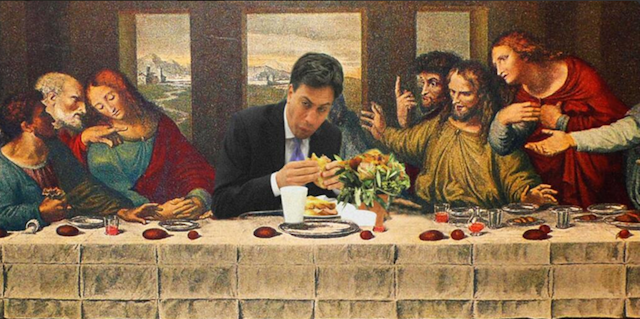The knives are out for Ed Miliband and he only has himself to blame. In the wake of the elections, despite doing well in London in the council elections and gaining seven seats in the European parliamentary elections, senior party figures are now openly criticising him.
One Labour shadow minister described him as “damaged goods”. The most damning attack was personal and came from a senior Labour figure, who said that Miliband “looks weird, sounds weird, is weird”. It may be that it was the bacon butty that did for Ed in the end.
Labour’s election campaign, orchestrated by Miliband but with no single person in control, was an unmitigated disaster. The televised party political broadcast was highly entertaining but a complete waste of money. It amounted to a personal attack on the Tories and Lib Dems with Nick Clegg singled out for special treatment. There was nothing whatsoever about Labour policy.
In the run-up to the elections, many of Labour’s initiatives were seen either as gimmicks or wide of the mark. Plans for patients to see their GP within 48 hours were seen through by the electorate. We can all remember what happened the last time: practices would not allow appointments to be made more than 48 hours in advance, thus ticking another “target met” box.
Then there was blunder of the poster accusing the Tories of increasing VAT on food – which is zero rated. Let’s not forget also that Ed, protector of the ordinary man, didn’t know the cost of his own weekly shop; but that’s hardly surprising, given the Milibands’ non-ordinary joint salaries of around £340,000.

All about Ed
The biggest criticism being levelled at Miliband by is own party is the narcissistic nature of the “all about Ed” campaign. It amounted to a political one-man band, with Ed banging the drum, crashing the cymbals, and blowing the Labour trumpet. There were no double-acts with members of the shadow cabinet such as Ed Balls, Harriet Harman, or Yvette Cooper – who many see at the Labour leader in waiting. That was a serious error of judgement. No leader is bigger than the party, as Margaret Thatcher discovered to her peril.
Labour, and the Tories for that matter, seriously underestimated to rise of UKIP and how well they would perform. Nigel Farage has managed to woo voters away from both parties. At first glance that’s quite an achievement, but given the two main parties are firmly in the middle ground it’s not that big a deal. All Labour seemed able to do was dismiss UKIP as a single-policy party. Now it is quick to point out that Farage and co have done well. There’s nothing like stating the obvious after the event.
If Labour is serious about replacing Ed Miliband as leader they need to be decisive and do it now; the election clock is ticking. The big question for Labour is how to regain lost ground. The old Ballsian rhetoric of “austerity isn’t working” simply won’t wash. Austerity was unpopular and painful, but the Tories will argue that it was necessary and, more importantly, it worked.
Not so long ago we were looking at deep recession. Then house building was stimulated by the Help to Buy scheme. Now the construction industry is in full swing – in the south east at least – and there is talk of the housing market overheating. It wasn’t so long ago that we were looking at sterling-euro parity, now sterling is strong, perhaps too strong. The next thing we will see is a steady increase in interest rates, probably up to a 3% plateau.
Is anyone listening?
Based on the results of the local elections, the BBC has estimated that Labour would win the next election, but would fall short of an overall majority, with 322 seats. The Conservatives would come second with 255, the Liberal Democrats with 45 and other parties including UKIP 28.
Of course we all know the turnout next May will be higher than 36%, those too apathetic to vote last Thursday will be spurred into action. The voting pattern will also be different, in local elections people tend to focus on local issues and they also provide an opportunity to teach the parties a lesson if they are thought to be ignoring public opinion. Next May voters will be very aware they are choosing a party that is capable of governing Britain for the next five years.
Labour, and the other parties, have a lot of work to do over the summer. Come the autumn the campaigning will begin in earnest. Any party reshuffles need to be put in train and bedded down before then. As things stand the future does not look bright for Ed Miliband, but will Labour have to courage to act decisively, or will they carry on backing a political donkey?

